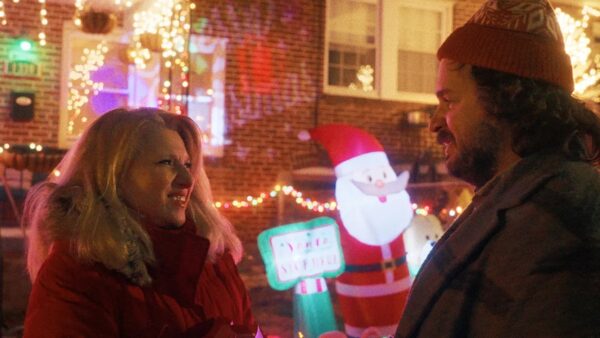Film Reviews: Three at the Provincetown Film Festival
By Tim Jackson
Films about relationships are often the highlights of the Provincetown Film Festival. Several of the narrative films at this year’s festival were about seeking connection: an elderly woman who is losing her memory clings to a fading sense of the past; a single woman searches for love “in all the wrong places”; and a frustrated comedian finds love in unexpected ways. The first film is a sad and universal story. The others — one from a first-time director — suggest that late millennials are having a hard time with commitment.

A scene from Familiar Touch. Photo: PIFF
The first scene in Sara Friedland’s Familiar Touch concentrates on Ruth, an octogenarian woman. Her back is to the camera as she searches through a small wardrobe, finally settling on a simple outfit. Ruth carefully prepares a sandwich for her grown son, an architect, whom she does not recognize and who eyes her cautiously. Their conversation is brief and ambiguous, and the sandwich remains uneaten. It becomes clear that Ruth is in a stage of dementia. Most of the film is set in Villa Gardens, an actual retirement and community memory care facility in Pasadena. Kathleen Chalfant, the 80-year-old veteran stage actor playing Ruth, blends in with the facility’s geriatric residents. (Alzheimer’s patients were unable to participate, as they could not sign releases.) A lot is going on: residents zip around in mobile carts, read to one another to exercise their cognitive skills, attend “dating” nights, and celebrate birthdays wearing party hats. The focus throughout is Chalfant’s sensitive performance; her neighbors add authenticity as well as a sense of compassion to what is an episodic narrative. There is no high drama here, just daily interactions.
In her previous work, Friedland experimented with films about movement and space. Here, she focuses on Ruth’s physicality as she struggles to control and navigate a world that is slipping away: a caress or a distant gaze intimates shifting emotions, at one point a long-lost sense of sensuous amour. Her son Steve (a quiet performance by H. Jon Benjamin) stoically deals with his mother’s changing personality. The film’s title is a reminder of how gentle contact can offer solace beyond words.
As a former chef, food preparation becomes one way Ruth can exert control. Her caregiver, Vanessa, played with sympathetic precision by Carolyn Michelle Smith, patiently waits as Ruth, suddenly believing herself to be part of the staff, commandeers the kitchen to prepare a breakfast. In one lovely moment, Smith’s Vanessa stares from a window onto the grounds as the worker shares a cigarette with a fellow aide, Steve (Andy McQueen). We can only wonder what memories or distant emotions are passing through their minds.
Ruth is the focus, but it becomes clear that the caregivers — almost all people of color — could not afford such a facility for their own families. In her post-screening Q&A, Friedland acknowledged that less than 3 percent of the population can afford the type of treatment shown in the film. She added that recent cuts to Medicare further devastate the quality of care elders receive in this country.
Films like The Father (with Anthony Hopkins), the early-onset memory tale Still Alice (with Julianne Moore), and Michael Haneke’s Amour focus on the tragic impact Alzheimer’s has on families. Familiar Touch takes another approach, focusing on adjustment and acceptance. Anyone with friends or family with similar issues will be touched by the grace and accuracy of Friedland’s film. (I visited a friend with early-onset Alzheimer’s at a similar facility a few weeks before seeing this film, which made my viewing experience personal.) In addition to awards for Best Debut, Best Director, and Best Actress at the Venice Film Festival, Familiar Touch received the juried John Schlesinger Award for Best Narrative Film at the Provincetown Film Festival.

A scene from Messy. Photo: PIFF
In her first film, which she both wrote and directed, actress, comedian, podcast host, and blogger Alexi Wasser cast herself as Stella Fox, the woman at the center of a story about contemporary dating in New York City. Wasser’s podcast a decade ago, “Boy Crazy,” dabbled in similar territory. In Messy, Fox finds herself navigating a romantic scene that’s filled with uncomfortable demands for sexual performance. (The film begins with Fox’s hysterical speech to the camera about the expectations and tribulations of hooking up.) The heroine remains optimistic (or is that delusional?) that any of these hookups might last. Once the main plot device is introduced — she is hired to write a series of articles about New York dating life for a smarmy magazine publisher — the film and its protagonist are free to misbehave royally. Living in Tudor City, Manhattan (where Wasser actually resides), Fox beds men willy-nilly with plenty of accoutrements, recreational drug use, binge drinking, and shallow sex. She is on a desperate hunt to connect. The men she seduces are vain and possessive, with sexual quirks that seem overly influenced by social media and online porn.
In her post-screening Q&A, Wasser described the genesis of her film in a monologue that was as wild as the film itself. (The audience gave her a round of applause.) Asked if these dates were based on her real-life experiences, she replied “not the worst parts.” As for the genesis of the movie, Wasser explained that when she first arrived in New York, her pitches and screenplays were summarily turned down. Rather than take that as a defeat, she decided to write a film that could be shot on a low budget based on what she knew or imagined about the city’s dating scene. The ensemble of actors who agreed to sign on to the project include Adam Goldberg (Dazed and Confused), Ione Skye, Thomas Middleditch, Jack Kilmer (son of Val), and Mario Cantone (Sex and the City). David Lowrey (The Green Knight), who acted as a producer, also makes an appearance. This group of seasoned indie actors knows how to keep a sitcom aloft — I was laughing and cringing throughout Messy.
At the Provincetown Film Festival, meeting and talking with filmmakers after most screenings is easy. Wasser is a bundle of energy and seemed genuinely flattered when I told her how much I enjoyed her film. I added that my wife, a psychotherapist, thought the film was sad. “Oh, I know,” she said, “but tell her I’m really OK.” I later discovered she is the daughter of a renowned photographer, the late Julian Wasser, who documented major moments of the ’60s and ’70s, including the iconic photograph of Eve Babitz playing chess naked with Marcel Duchamp.

A scene from The Baltimorons. Photo: PIFF
The Baltimorons is the first solo directorial effort from Jay Duplass since his Mumblecore classic The Puffy Chair in 2005. Since then, he and his brother Mark have become prolific film and television producers, directing and writing myriad dual projects. This low-key effort has the same charm as Jay Duplass’s earlier film, but without his brother’s loose, improvisational style. In this feature, Duplass collaborated on a script by comedian, writer, and actor Michael Strassner, who undertakes his first film role. Duplass knows how to keep performances easy and natural, and together they have created a charming romantic comedy about a depressed comedian who falls for a female dentist.
The film opens with Strassner, as Cliff, attempting suicide, which goes farcically wrong. The scene, based on a real-life experience, serves mainly to establish an initial tone of desperation. The Baltimore odyssey begins in earnest when Cliff has a breakdown at a family Christmas Eve party. A middle-aged divorcée named Didi is the only available dentist who is willing to help. When he finally leaves the dental office, Cliff discovers his car has been towed. Didi, played by Liz Larson, offers him a ride to the tow lot, which is closed. That triggers a night of unexpected challenges and burgeoning romance in Baltimore. Didi, small and tough, makes for an amusing contrast to Strassner’s hefty wisecracking comic. This is an apt pair for a low-budget indie romcom.
Over the course of a single night, Cliff bumbles through various adventures, eventually ending up on the stage he promised his fiancée he would avoid. His earlier drinking problems stem from hanging out at too many late comedy nights; his problems with alcohol eventually got him fired by his former theater group, “The Baltimorons.” Coerced by the crowd to perform an improv, Cliff brings the reluctant Didi on stage for an awkward sketch about a dentist’s office. That scene evokes the breezy ambiance the Duplass brothers are known for — a gentle humanity that is nurtured by the chemistry between the two leads.
Gerald Peary on this year‘s Provincetown Film Festival.
Tim Jackson was an assistant professor of Digital Film and Video for 20 years. His music career in Boston began in the 1970s and includes some 20 groups, recordings, national and international tours, and contributions to film soundtracks. He studied theater and English as an undergraduate, and has also worked helter-skelter as an actor and member of SAG and AFTRA since the 1980s. He has directed three feature documentaries: Chaos and Order: Making American Theater about the American Repertory Theater; Radical Jesters, which profiles the practices of 11 interventionist artists and agit-prop performance groups; When Things Go Wrong: The Robin Lane Story. And two short films: Joan Walsh Anglund: Life in Story and Poem and The American Gurner. He is a member of the Boston Society of Film Critics. You can read more of his work on his blog
Tagged: "Familiar Touch", "Messy", :The Baltimorons", Alexi Wasser, Jay Duplass, Provincetown Film Festival, Provincetown Film Festival 2025

Great reviews, Tim. Both personal and universal in explanation and details.